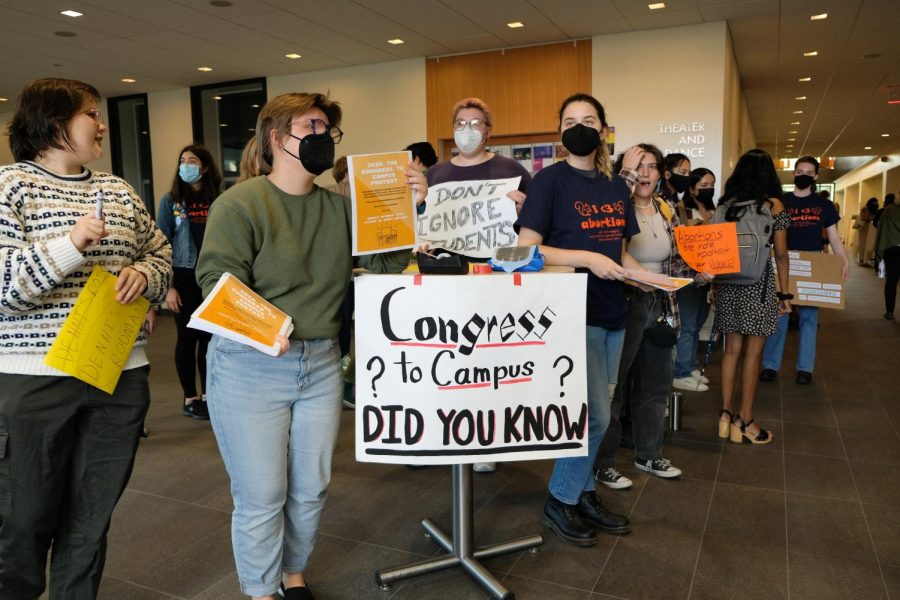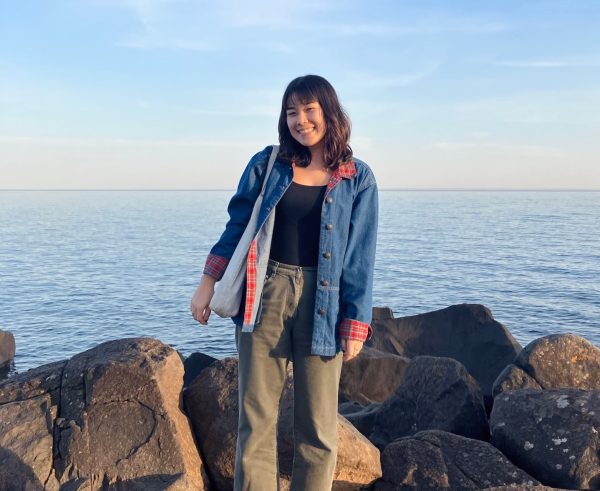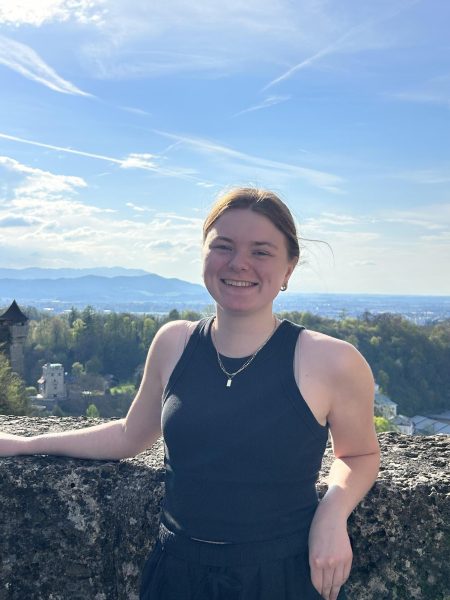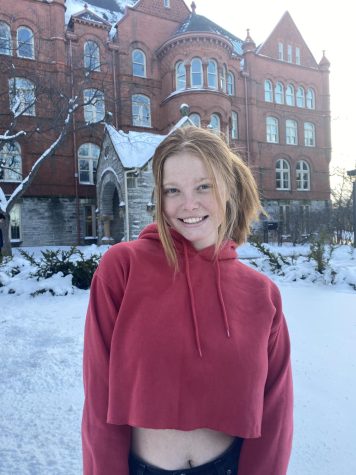Congress to Campus: the event and moving forward
Students gather in the Janet Wallace lobby to protest Congress to Campus. Photo by Jerome Paulos ’26.
October 13, 2022
On Monday, Oct. 10, Macalester hosted Congress to Campus despite student concerns in the weeks leading up to the event. The discussion, featuring former Congressmembers Sam Coppersmith (D-Ariz.) and Dennis Ross (R-Fla.), focused on the Supreme Court’s Dobbs v. Jackson Women’s Health Organization, the overturning of Roe v. Wade and reproductive rights. In response, the event — built upon the college’s idea that “part of our community’s work includes practicing how to communicate across differences,” according to an announcement in the Mac Daily from Sept. 26 — was met with student protest.
While the event was not scheduled to begin until 4:45 p.m., roughly 50 students gathered in the lobby of the Janet Wallace Fine Arts Center as early as 4 p.m. to protest outside Mairs Concert Hall where the discussion was set to take place. Many held signs in protest of the event, several of which criticized the college’s choice to host the event and the way in which it was planned, emphasizing a failure to seek and listen to student feedback. Other posters advocated for reproductive freedom and human rights at large.
Bea Green ’22 and Elise Sexton ’23, who organized the student protest, explained that even though they had only a short amount of time to coordinate protest efforts, they were pleased with the number of students who joined them.
“We did not have a lot of time for advertising [a student protest],” Sexton said. “Most of our community outreach was through word of mouth, so we’re very grateful for [this] turnout.”
With the exception of a few short argumentative exchanges, the student protesters did not engage in heated debate with those who attended the event.
Student protesters left the building shortly after the event began.
Alongside those protesting, a group of students affiliated with the Young Democratic Socialists of America (YDSA) also showed their frustration towards the event. Throughout the protest and the event itself, they spoke to students in the lobby and handed out pamphlets with calls to action surrounding abortion rights.
The event occurred unchanged and as planned at 4:45 p.m. President Suzanne Rivera delivered a short opening address. While she did not directly address the student protestors outside, Rivera acknowledged controversy surrounding the discussion topic and offered some explanation for why she and others believed this event was worthwhile.
“In your lives outside of Mac, you will encounter people who see the world differently,” Rivera said. “ It’s inevitable that we will not always agree on every issue, and it’s important that we learn how to engage across those differences … At the heart of Macalester’s values is that we believe that we are stronger because of the diversity of perspectives in this room and on this campus … I believe we’re capable of having this complicated conversation today.”
Three forensics students, Sarah Beth Hobby ’24, Austin Wu ’23 and Gabe Karsh ’25, were previously selected to ask Coppersmith and Ross one question. After their questions, professors and main organizers of the event Duchess Harris and Andrew Latham presented questions from the audience, who were encouraged to submit questions using a live link.
Before Ross answered the first question, three students stood up and began a chant in protest. As per Congress to Campus guidelines, which state that students may not interrupt the discussion, the students were asked to leave.
For all the controversy surrounding this event, the rest of the evening went smoothly. Coppersmith and Ross made it very clear that they were having a discussion, not a debate. While the topic they discussed was heavy, their answers were vague. Neither talked extensively about their personal views on abortion rights and instead focused their speech on broader notions.
Coppersmith opened the night with his thoughts on what he considers the constitutional right to privacy.
“The idea is that only what’s in the [Constitution] can guide the court — that what was thought to be correct in the 18th century has to guide us today —is an inherently conservative philosophy,” Coppersmith said. “So in light of modern life, you have to see a possible way to privacy and autonomy. That has to be an essential part of what it means to be a citizen now.”
Ross, on the other hand, focused his efforts on persuading the audience of this event’s importance for political change.
“I’m not here to change your mind,” Ross said. “I know that I’ve got as much chance to change your mind as you do changing my mind. And I respect that, but I also know that [without] the opportunity for you to have the process on which you can vet your ideas and your opinions and to understand diverse thoughts, how are you going to be able to arrive at the truth?”
Latham and Harris only had time to ask three questions from the audience as the discussion wrapped up promptly at 5:45 p.m.
The Congressmen’s presence extended beyond the official Congress to Campus discussion. Built into the Congress to Campus program that that school signed a contract with are other opportunities for students interested to engage with these former Congressmen. The two attended dinners, lunches and classes with interested professors and students.
One of the three classes Coppersmith and Ross attended was political science professor Lesley Lavery’s class, Politics and Inequality: The American Welfare State, for an informal Q&A with her students.
Lavery welcomed them into their classroom and thought it was beneficial for her political science students to speak to former policy makers. Their discussion was not centered around Dobbs v. Jackson, but rather focused on students’ questions about their time in Congress.
“As someone who teaches political science and policy, I would absolutely welcome them to come back to a classroom and I think the stakes were lower when it was in a classroom, and we’ve built a community in our classroom where students know each other,” Lavery said. “Hopefully they felt safe asking questions. I hope that everybody felt like they were included in the conversation if they wanted to be and didn’t come if they didn’t want to.”
Rivera facilitated the contract with Former Members of Congress, the organization who founded Congress to Campus, that created this event and ensured its stability for the next five years. In an email to The Mac Weekly, Rivera detailed her response to students protesting.
“Protest is an essential part of a healthy democracy and I encourage all members of our community to speak out when they have a concern,” Rivera wrote. “Student protests about this specific event do not change the extent to which I feel it is a priority to foster the exchange of ideas on our campus. I also don’t think we should be shielding students from sensitive issues. Mac students are adults of voting age and, if an issue is on the ballot, it’s important that they are well-informed voters.”
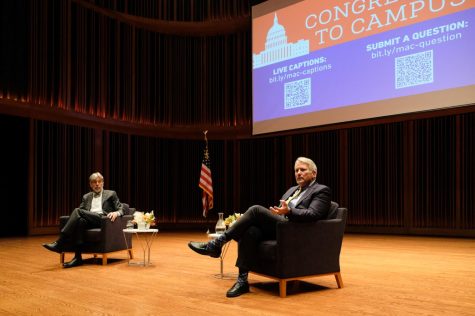
Following the discussion, students reflected on their participation and various roles surrounding the event. Hobby shared her initial thoughts on the event, pointing to the importance of listening to alternative perspectives in order to later engage in meaningful dialogue.
“I’m from a pretty conservative part of the South, so I am used to having conversations about abortion with people who have a really broad range of opinions,” Hobby wrote in an email to The Mac Weekly. “I felt like it would be a great opportunity for people on campus to hear more about the arguments [and] perspectives of those on both sides of the political spectrum so that we can all be more informed when going into conversations in the future.”
Karsh, whose question centered around the incompatibility of the Jewish faith with restricted reproductive rights, also detailed his motivations for being involved in the event and for submitting a question.
“I had done a lot of learning about Jewish views on abortion after the Dobbs decision,” Karsh said. “We talked about it in the Macalester Jewish Organization recently … and we talked about abortion too. I thought that this was an important side of the debate that didn’t get talked about a lot because, I think, often we sort of assume that people of faith are pro-life, and that’s not the case.”
However, Karsh also explained the complexities of his position within the event.
“I wanted to go because I wanted to ask my question, and I thought that it was going to produce a valuable discussion, but I also certainly appreciated the criticism of the event,” Karsh said. “My [discomfort] was that, I thought, in some ways, they were right.”
Overall, those who posed questions expressed mixed feelings towards the event as a whole, describing a disconnect between the intentions of the event and how productive it was in achieving those goals.
“I don’t think either Ross or Coppersmith directly answered [my question],” Wu wrote in an email to The Mac Weekly. “Ross likely knew his audience and didn’t want to engage … I don’t think it did a great job modeling civil political discourse either.”
However, Wu and Hobby emphasized the hope that the event would start and further conversations surrounding reproductive rights among the student body.
“If people come away from the event talking about abortion access and talking about what the Dobbs decision means for people who give birth, then it was a success,” Hobby wrote.
Similarly, Sexton and Green hope that their protest of the event is not the end of their work. They continue to plan on writing a “Call to Partnership” to instigate change.
“The goal of [the Call to Partnership] is to bring into conversation administrators of Macalester College, anybody who would be involved in Congress to Campus events moving forward … and students who feel like they want to be a part of that conversation to make sure this [exclusion] does not happen again,” Sexton said.
By bringing more community members into conversation, Sexton and Green hope to address their fellow students’ concerns about how the college mismanaged the event, such as their choosing of the topic, location and date of the event, as well as its formal structure.
“This was an event that was designed to both be controversial and to also be community building,” Sexton said. “But all these decisions were made without student input, so how is that community building?”
Sexton detailed their hopes for what will come out of this event and that it will become a stepping stone for future events and relations with administration.
“[The goal is] that this does not stay dividing the campus and instead becomes an opportunity to build a strong community and build relationships across campus and to administration,” Sexton said.
Cal Martinez contributed to the reporting for this story.

